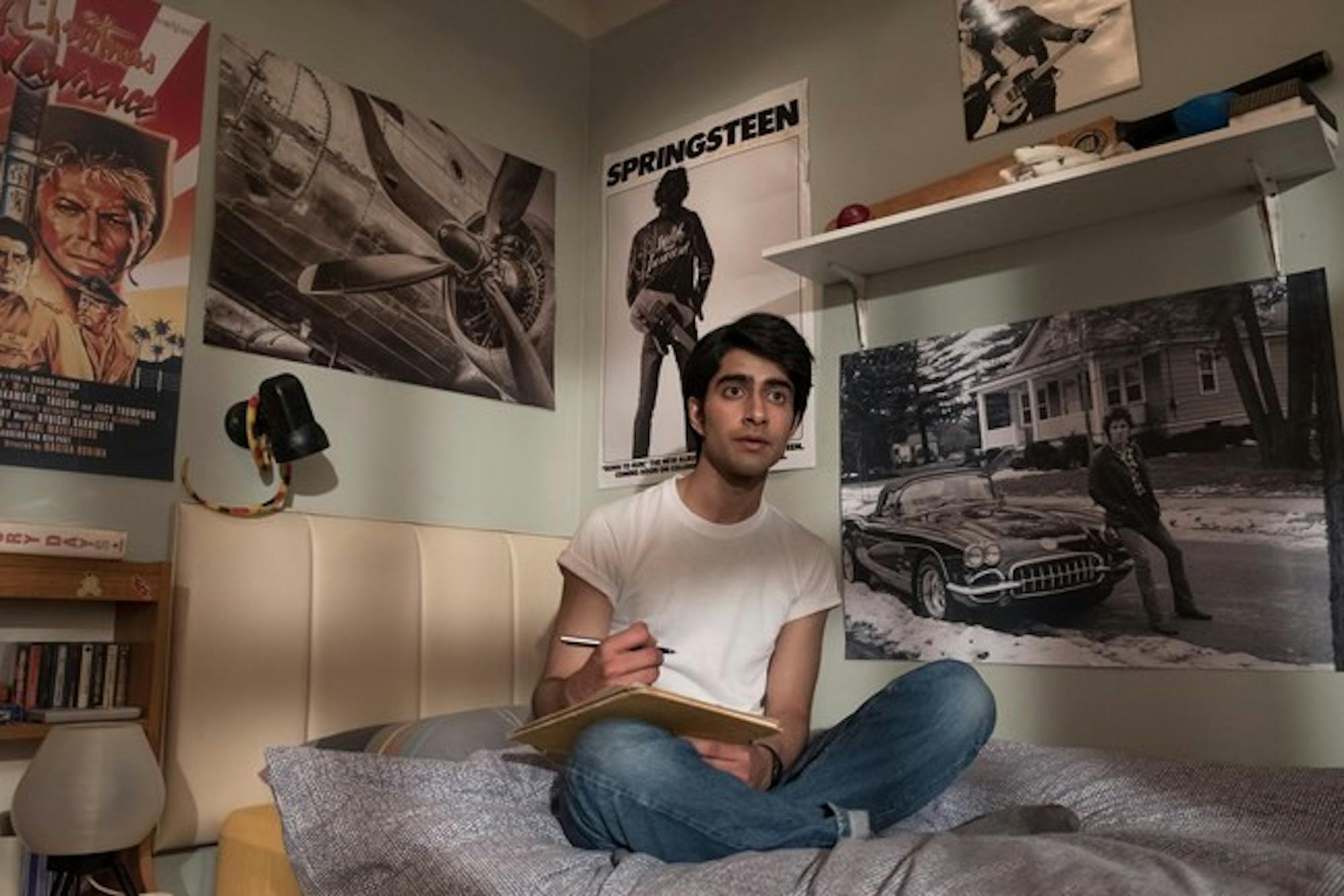
Few emotions are as transcendent and universal as the feelings of self-doubt, anxiety and possibility that color our youth, one of the reasons why coming-of-age films have been such a dependable staple in the cinematic world. However, recent releases haven’t effectively portrayed how factors beyond age and gender can intensify the pre-existing growing pains of teenagedom — which is what makes director Gurinder Chadha’s “Blinded by the Light,” a musical dramedy, so special. It aptly adds nuance to the familiar bildungsroman by illuminating how class and nationality can complicate a teenager’s relationship with self-determination.
Based on the life of journalist Sarfraz Manzoor, “Blinded by the Light” follows Javed (Viveik Kalra), a young British-Pakistani boy and aspiring writer, as he navigates the cultural clash between his predominantly white hometown of Luton, England, and the values of his father, Malik (Kulvinder Ghir), by listening to Bruce Springsteen.
The film, set in 1987, weaves in notable costuming elements to visually communicate the times. Javed’s close friend Matt (Dean-Charles Chapman) is typically clad in some acid-washed Canadian tuxedo or heavily shoulder-padded suit. Extras dawn ridiculous haircuts à la A Flock of Seagulls. Eliza (Nell Williams), Javed’s crush, wears fishnet fingerless gloves and crimped side ponytails as she passes out “Free Mandela” flyers in the lunchroom. Beyond these characterizing visual elements, “Blinded by the Light” uses two defining historical markers of late 1980s England to build the film’s setting: the skyrocketing unemployment rate under Prime Minister Margaret Thatcher’s administration and the growing visibility of white nationalism among disgruntled working-class men.
Between light-hearted dance sequences and sing-songy moments when Javed and friends belt out the lyrics to “Born to Run” and other Springsteen classics, Javed avoids National Front members on his walks home from school. Chadha finds an impressive balance between depicting the aimlessness of hazy school days and the looming possibility of racially and religiously motivated attacks that pervade the lives of Javed and his community.
For its first two acts, “Blinded by the Light” portrays Malik as the villain. Industrious and overbearing, Malik rules the household and collects all the family’s work earnings — his wife Noor’s (Meera Ganatra) pay as a seamstress, Javed’s summer job money, etc. Malik does not champion Javed’s dream to be a writer, a dream that is solely supported by Javed’s literature teacher, Ms. Clay (Hayley Atwell), and his Sikh friend, Roops (Aaron Phagura), who first introduces him to Springsteen’s music. When Malik loses his job at the General Motors factory, he pressures Javed, Noor and his daughters, Yasmeen (Tara Divina) and Shazia (Nikita Mehta), to help make ends meet.
Javed struggles to appease his father and determine what it means to live in the hyphen between British and Pakistani. However, as the film explores this struggle, it clumsily portrays Pakistani tradition and values as intrinsically enigmatic, rather than acknowledging the conflict between Western individualism and the collectivist mentality of his parents’ Karachi upbringing. Malik should not have been portrayed as the one-dimensional and rigid immigrant father. Nor should Noor have been the docile, ever-suffering mother. Their opposition and suspicion to the world that Javed finds redemption within — the literary world and the dizzying, glorified gumption of Springsteen’s lyricism — comes from their fear that that world is indifferent toward their son. Malik is fearful, not merely that Javed will fail but that the world he wants so desperately to belong to will fail to see him.
“Blinded by the Light” communicates Malik’s fear and concern in a series of compelling, difficult spats peppered throughout the film. Kalra and Ghir deliver in all of them. But Malik’s fear is coded as anger and disappointment in his son’s flirtation with what he refers to as Britishness — the conviction Javed feels that he should pursue his dream rather than simply obey the practical wishes of his family. These are complicated and enriching human struggles. But “Blinded by the Light” falters because it fails to establish that Javed is not simply being antagonized by his father, oscillating on his dream and wedged between two cultures. Rather, he is embroiled in a familial tradition that treats love and obedience as the same thing, while British teenagedom falsely communicates that personal fulfillment is the default priority for all young people.
For a majority of the film, Javed ping-pongs between the benevolent white figures in his life and the tension he endures at home. Matt incessantly demands that Javed provide his dodgy band new lyrics, but is quietly forgiven in the film for being dismissive of Javed’s personal struggles because Matt’s father (Rob Brydon) hires Javed when Malik is laid off. Ms. Clay submits Javed’s essays into international competitions and encourages him to be a writer without seriously reconciling with the punishments Javed faces at home as a result. It is difficult to discern which character dynamics are purely biographical and which aren’t gracefully articulated in light of the film’s message, but it is undeniable that the film takes too long to humanize the people it ultimately champions.
Moments of violent racial and religious attacks elicit sympathy from the audience. However, the film takes so long to develop a nuanced perspective on the lives of Javed’s sisters and the intentions of elders in his community that it feels somewhat like an afterthought. His sage declaration that he wants to “build a bridge to [his] ambition but not a wall between himself and his family” redeems “Blinded by the Light” and swaddles the film in a self-awareness that it intermittently lacks. Regardless of its weaknesses, “Blinded by the Light” is a beautiful meditation on the emotive prowess of rock ’n’ roll and the challenges of growing up in the penumbra of multiple social spheres. It is a must-see for people in search of a complex coming-of-age story.
Grade: B+








